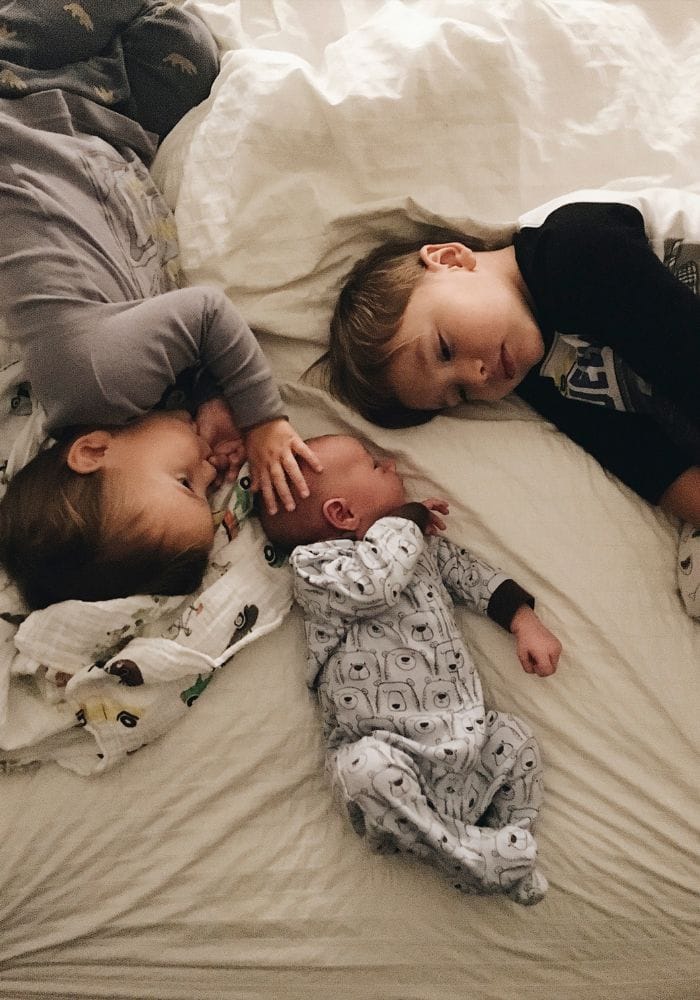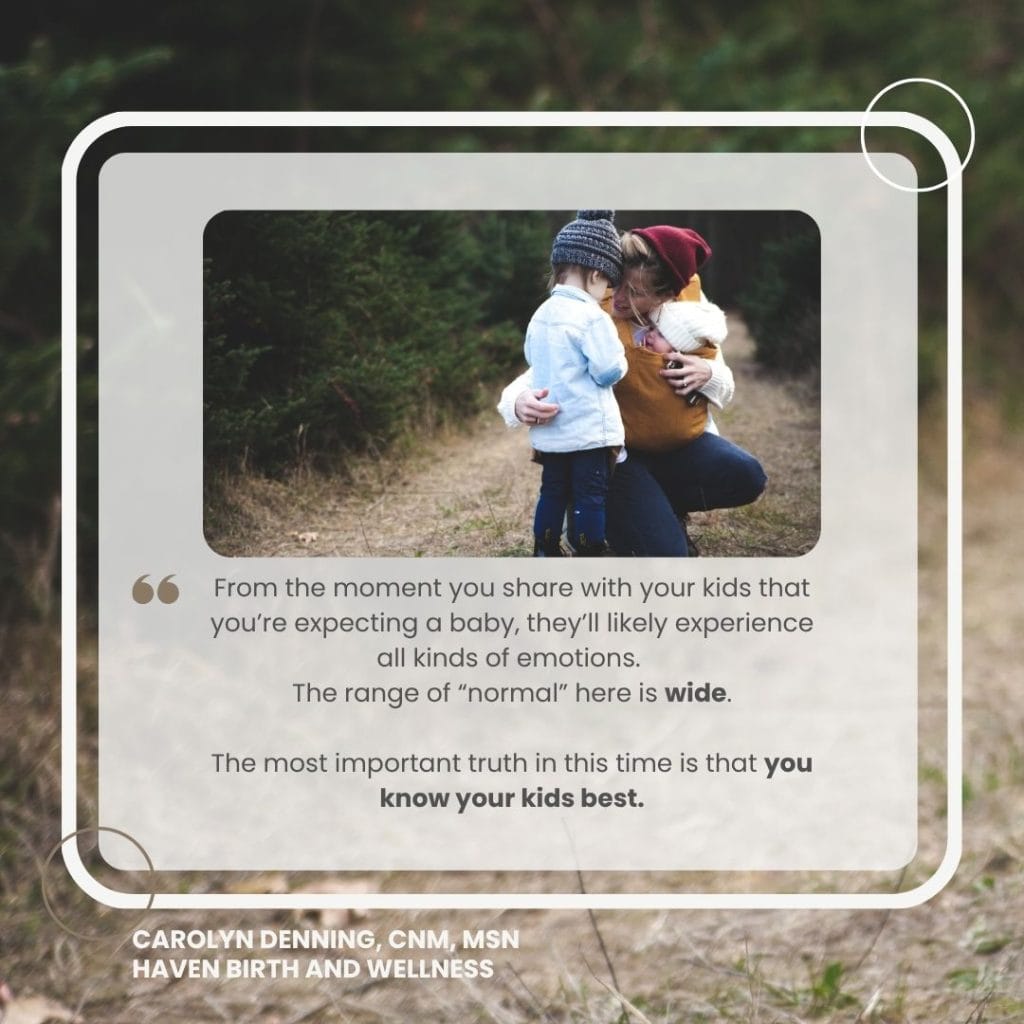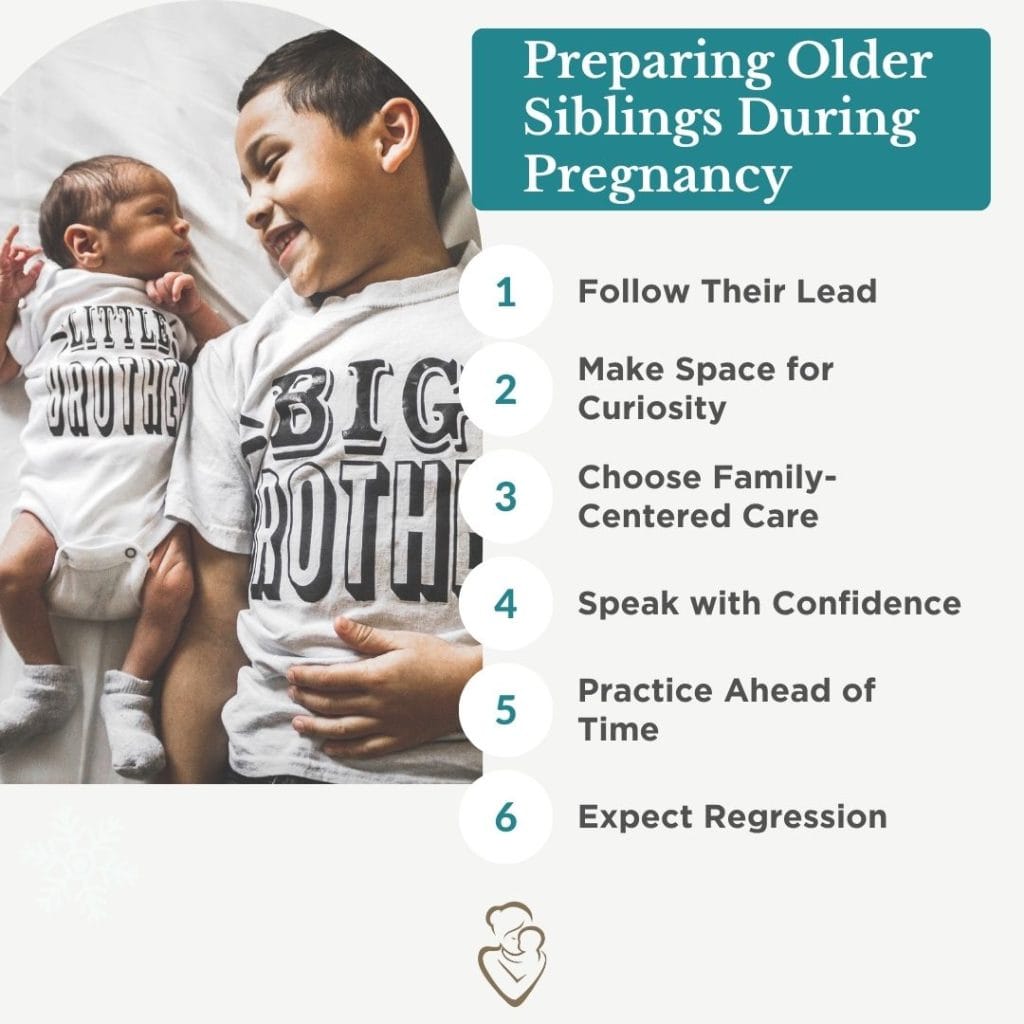

Welcoming a new baby in the family affects more than just mom and dad; it affects the older siblings as well.
As a midwife, I hear from many parents worried about how their children will react to a new sibling. How can we reassure them? How do we foster excitement for the new baby? Should older kids be present for the birth? How do we handle postpartum with multiple children?
I love questions like these because they show just how much parents care about the whole family’s experience. And the truth is, there’s so much you can do to make welcoming a new baby to the family special for your big kids, too.
Let’s talk about it!
Welcoming a New Baby in the Family: What’s Normal?
From the moment you share with your kids that you’re expecting a baby, they’ll likely experience all kinds of emotions. The range of “normal” here is wide.
The most important truth in this time is that you know your kids best. You know how they communicate, how they express their emotions, and what suits their personality and development. While I’ll provide some tips and general guidelines here, only you will know what works for your unique family. Trust yourself.

Tips for a Successful Transition
Transitions can be challenging, of course, but they’re also rewarding.
Expanding your family is a transition for everyone. But welcoming a new baby bears so much fruit in a family, not only in greater joy and love but also in stretching and growing together as a united whole.
Here, we’ll look at steps you can take to smooth the transition for older siblings, from pregnancy to postpartum.
Preparing During Pregnancy
After your older children learn that they’re expecting a new sibling, consider their interest and stage of development for your next steps. Again, remember to trust your knowledge of your child and their particular stage of development.
Follow Their Lead
When you first share your news, some children will be immediately excited and full of questions. Others might be more standoffish, not necessarily showing outward interest but probably taking in and absorbing more than you think. Both responses are completely normal.
I suggest letting each child lead the way with their questions and interest level. For children unphased by the news, there’s no need to push them or put them on the spot. For more curious children, you may face more specific questions than you ever realized they’d ask.
In the latter case, I find keeping answers simple and specific to the question helpful. It’s easy as adults to go rather broad with our responses, accidentally answering far more than the original question actually entailed.
In other cases, you may invite a very interested child to join you at prenatal appointments. They might like to ask questions, just want to listen, or enjoy pressing the Doppler button or helping measure mom’s belly. Supporting your kids’ curiosity and interest is so beneficial at this stage of transition.
Find Family-Centered Care
Finding a provider who interacts with your whole family well offers a truly special experience for older children. We really value this at Haven, where we strive for family-centered care even while caring for mom and baby.
I suggest looking for a provider who will notice the whole room — from the three-year-old in the corner to the tween beside dad — addressing them and offering small, fun ways to participate verbally or practically.
Speak Positively
Pregnancy and birth are normal parts of life, and they’re all around us. In a culture that often views them with concern, sometimes even fear, you and dad have an opportunity to set a different tone for your children.
Parents provide the nearest example their children will likely see of pregnancy and birth — and those little eyes, ears, and hearts are taking in everything. How you talk about, frame, and approach pregnancy and birth will greatly impact your children’s attitudes and emotions about this normal, beautiful process going forward.

Set Them Up for Success
Looking ahead, it’s helpful to take proactive steps to set your kids up for success once baby arrives. For example, if you hope they’ll help with diaper changing or picking out clothes, go ahead and start practicing before the birth, with lots of reinforcement. Relatable tools like dolls, books, or stage-appropriate analogies can really help with this early preparation.
An important note: Most children will regress in some ways when welcoming a new baby in the family.
This doesn’t mean you’ve done something wrong. It simply means they’re moving through a big transition as their little hearts try to figure out their place in this new reality. For this reason, it’s helpful to try to time other big transitions (think: potty training, changing bedrooms, etc.) before or well after baby’s arrival if you can.
Remember, older siblings just need a little extra grace and consistency until they find their new equilibrium and can move forward again with confidence.
Preparing for Birth: When Siblings Are Present
Some families decide to include one or more older siblings in the room for the birth. If you’re unsure, again, I’d encourage you to trust your knowledge of your children. You know best whether the experience would be exciting, interesting, overwhelming, etc. for them.
Remember to include the needs of the whole family in the equation. If having your older children present would cause you stress, for instance, then maybe they can stay with a friend or family member so you can focus on the intense work you need to do.
This is a highly personal decision and one that varies widely from family to family. There’s no “right” way, except that whatever you decide should take into account the needs of everyone involved — mom, dad, and kids.
If you do decide to have your children at the birth, here are some of my recommendations:
Limit the Pressure
Choose someone to stay in the room with your child during labor and birth. This should be someone they’re comfortable with, who’s comfortable in the birth setting, and who will be exclusively responsible for your child — not a shared support person between you both.
I also recommend ensuring your children understand they have the freedom to leave. Do your best to reduce any pressure they feel by helping them (and their support person) understand they don’t have to stay in the room if the experience becomes too much.
Prepare Their Minds
It’s important to prepare your children for what they might see and hear at the birth. For example, “Mom might not be talking or interacting very much, but that’s okay. She’s doing really hard work.” Or, “Mom might have to make a lot of sounds, but that’s part of the plan.”
One analogy for kids I’ve heard and loved is strong things make noise. When a big truck revs its engine, it’s loud! Mom is like a big truck revving up to do some hard work.
Additionally, let kids know about biological elements they might see, such as fluids and the umbilical cord, and that baby will come out wet and likely screaming. Help them understand that this is all normal and safe.
Excited and interested children may be looking forward to holding or feeding their new sibling for the first time, so prepare them for what to expect immediately after birth. For instance, share that mom will hold baby first, but that they’ll get to do fun things like holding and dressing their sibling soon.
You might also consider showing your kids a previewed, approved birth video to help prepare them for birth. Here are some options for you to review and decide which ones are good for your child to watch!
- Haven client birth videos
- Birth Becomes video library
- Bridget Teyler’s educational birth story
- Beth Moore’s raw and emotional water birth
Include Siblings in Practical Ways
Older siblings who want to participate can help in small but meaningful ways. For instance, some might like to help by bringing mom water or food. Others may be able to help with cutting the umbilical cord, and still others might enjoy the newborn exam, listening with the stethoscope or watching baby get weighed.
You might consider helping older kids prepare a gift for their new sibling, or even preparing a gift “from baby” to them. If you’re comfortable bringing it up, close family and friends could help with the transition by doing something special for older siblings alongside baby gifts. Getting a “big brother” cupcake can go a long way to easing feelings of loneliness or jealousy sparked by all the presents and attention for baby.
Preparing for Postpartum
Maintain One-on-One Time
As mentioned above, older siblings often regress after a new sibling’s birth, and it’s perfectly normal. One strategy that can help is prioritizing ways to maintain one-on-one time with them postpartum.
This isn’t meant to be a high-pressure endeavor. As little as 10 to 15 minutes a day with each child can make a world of difference, and you can be creative with how you accomplish it.
For instance, since you’ll need to be in bed more during the first week, perhaps invite an older child to crawl into bed next to you and color or read a new book. Find creative ways to accommodate both their needs and yours. This is a special, temporary situation that won’t look like life always does.
Remember that dad is a helpful resource here. When it’s time for you to hang out with your older child, within earshot you might say, “Hey Dad, would you mind holding this baby? I really want to hang out with Susie.” Let your child hear that you want to focus on them and that baby will be safe with dad.
Prepare Kids for Childcare Help
If you’ll have friends or family helping with childcare, I recommend getting your kids acquainted with their caregivers ahead of time. Whether it’s friends or relatives they’re less familiar with, you can set up play dates ahead of time to ensure your kids are comfortable and prepared when someone steps in for a few hours to help out.
Welcoming a New Baby in the Family: Final Thoughts
Welcoming a new baby in the family is a transition for everyone, but with thoughtful preparation and lots of grace, it can be one of the most beautiful chapters in your family’s story.
I can’t emphasize it enough: You know your kids best. Whether your children are present for the birth or not, whether they’re immediately excited or need time to warm up to a new sibling, you can create a truly special experience for your whole family.
Trust yourself, and remember that this transition, while sometimes challenging, bears much fruit and growth for everyone involved.

Carolyn Denning, a midwife at Haven Birth and Wellness, grew up in the suburbs of Detroit and earned a degree in Human Physiology from Michigan State University. Her passion for supporting women through pregnancy led her to midwifery, starting as a doula while completing her nursing degree. She gained valuable experience as a Pediatric Emergency and Labor and Delivery nurse at Vanderbilt.Carolyn and her husband, Dustin, served as missionaries in South Africa, where she supported pregnant women and experienced her own transformative home birth. She is a proud mother of two girls, Levy and Josie, and enjoys traveling, exploring nature, and learning about different cultures.
